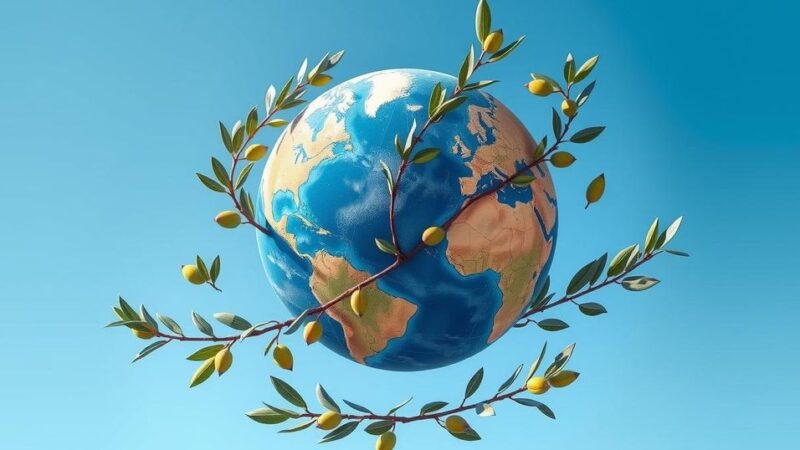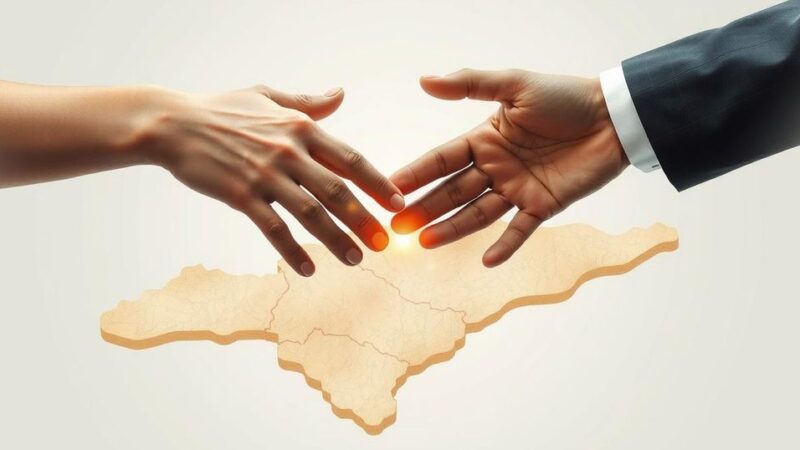Lebanon anticipates a wave of diplomatic activity as Jordan’s Foreign Minister visits and invites from Qatar and other nations pour in for President Joseph Aoun. Following the presidential election, international leaders stress their commitment to supporting Lebanon’s recovery, addressing military engagements, and advancing essential economic agreements.
Lebanon is set for significant diplomatic engagements over the coming days, marked by the arrival of Jordan’s Foreign Minister Ayman al-Safadi in Beirut on Thursday, closely followed by visits from the UN Secretary-General and the French President. The international community has rallied behind Lebanon following the election of President Joseph Aoun, which came after a protracted two-year deadlock, and the appointment of Nawaf Salam for cabinet formation.
During his visit, Safadi met with President Aoun at the Baabda Presidential Palace and expressed hope that the new leadership would assist Lebanon in re-establishing its status as a regional economic and cultural center. He emphasized the urgency for reconstruction due to the devastation inflicted by the recent Israeli-Hezbollah conflict, which culminated last year, leading to significant loss of life and destruction in south Lebanon, Beirut, and the Beqaa region.
The visit was also an occasion to reaffirm the necessity for Israel to adhere to the ceasefire deal reached on November 27, which dictates the withdrawal of Israeli troops from southern Lebanon and the repositioning of Hezbollah forces. Despite the ceasefire agreement, Israel has reportedly violated its terms by carrying out airstrikes and detonation activities in border communities.
Safadi stated, “We provided whatever support we could previously, and we will continue to do so, in cooperation with the international community, so that the [Lebanese] army can carry out its basic role…” He also revisited the long-planned initiative to facilitate electricity exports from Jordan to Lebanon, which had stalled due to U.S. sanctions on Syria.
In addition to Aoun, Safadi met Lebanese Parliament Speaker Nabih Berri, who noted that Lebanon is entering a transformative phase in its history, emphasizing continued collaboration with Jordan. Safadi’s discussions included various Lebanese political leaders, including outgoing Prime Minister Najib Mikati and incoming Prime Minister Nawaf Salam, who is working on cabinet formation.
Furthermore, Qatar’s Ambassador to Lebanon conveyed an invitation from Emir Sheikh Tamim bin Hamad Al Thani to President Aoun for a visit to Doha. Qatar has committed to supporting the Lebanese army through 2025 and has historically played a mediating role in Lebanese politics, significantly aiding during past leadership crises.
President Aoun is also set to embark on his first foreign visit to Saudi Arabia, having received multiple invitations from countries including Jordan, Spain, and Greece. On the following day, French President Emmanuel Macron is expected to arrive in Beirut to congratulate Aoun, marking his first visit since 2020.
Macron’s visit aims to reaffirm France’s commitment to Lebanon’s sovereignty and unity. France, alongside other key players, played a vital role in facilitating the election of a new president after an extended political impasse. Macron previously called for impactful reforms within the Lebanese governing body, although many proposals remain unaddressed.
Additionally, UN Secretary-General Antonio Guterres is slated to visit Lebanon for two days, chairing a multinational committee overseeing the implementation of the Lebanon-Israel ceasefire agreement at the UNIFIL base. This meeting will address ongoing developments regarding the Israeli military’s withdrawal from southern Lebanon and the deployment of the Lebanese army in border areas.
The diplomatic landscape in Lebanon is changing following the recent election of President Joseph Aoun, which concluded a lengthy political vacuum. Jordan and Qatar, significant players in the region, have both expressed support for Lebanon and engaged in discussions regarding reconstruction, military support, and bilateral relations. With international attention on the fragile ceasefire agreement between Lebanon and Israel, efforts are being made to stabilize the region and ensure compliance with established treaties.
The diplomatic visits to Lebanon by various leaders signal a renewed commitment to support the nation amidst its ongoing recovery from war and political instability. Jordan and Qatar’s initiatives highlight international solidarity towards strengthening Lebanon’s military and economic frameworks. The engagements also emphasize the critical need for adherence to the ceasefire agreements to ensure lasting peace and reconstruction efforts.
Original Source: www.newarab.com







